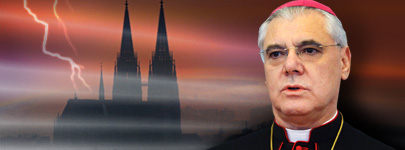 Millions for the bishops: Why the German state pays the wages for the church (2010)
Millions for the bishops: Why the German state pays the wages for the church (2010)
How did Germany become the cash cow of the Vatican? An English transcript of the lively Spiegel video from 7 June 2010 reveals this unknown story. A few weeks after it came out, German politicians broke a taboo and began to publicly question their 200-year-old tradition of taxing everyone for the salaries of clerics at a cost of about €480 milllion in 2014. (This is in addition to, and roughly equal to the “church tax” for members.)
These payments are made to the two main churches, Catholic and Protestant (Lutheran), whose property was confiscated during the Secularisation in 1803. These state subsidies (Staatsleistingen) for 2013 totaled about €480 million. [1] This is over and above the more than €10 billion in "church tax" that the government also collected for the two churches that year, (€5.5 billion euros for the Catholics and €4.8 billion for the Protestants). [2]
The payments demanded from the German state for over 200 years are of unlimited duration, yet a few months after this programme was aired, the German Catholic Church demanded that its own (one-time) payments to victims of clerical abuse be strictly limited by a compensation ceiling of €5000, which is no more than a priest’s monthly salary, and the Church alone decides what fraction of that it wants to give each victim. [3]
Summary of English transcript of the German-language documentary
Millions for the bishops:
Why the German state pays the wages for the church (2010)
[The announcer refers to the German austerity plans, which were made known a few hours before, to cut at least €10bn annually until 2016. Low wage earners and those made jobless by these measures will suffer ― but not the clerics. [4]]
This morning the Government began pondering where Germany can cut expenses. Everywhere belts are to be tightened. Only one area is spared, the Catholic and Protestant church dignitaries. For ― what hardly anyone knows ― in addition to the “church tax” [5] the state also pays the wages of our heavenly representatives. And, be that as it may with Christian frugality, they are decidedly princely. [Here we report] about ways to save millions.
It’s a ceremony paid for by the state: the Corpus Christi services in the Regensburg Cathedral. The Catholic Church likes to present itself in grand style and it can certainly afford to. That's because the salaries of the church dignitaries are paid for by the taxpayers, year after year. This is over and above the “church tax” and it costs millions more.
For critics this is a scandal.
[Dr. Carsten Frerk is an expert on church finances:]
The seven Bavarian dioceses have a yearly income from “church tax” of about €1.2 million ― a nice income. They [also] get paid by the Bavarian State ― I’m quoting from the budget: the wages of 7 archbishops and bishops, of 2 auxiliary bishops, 14 dignitaries, 7 cathedral sacristans, 60 canons, 12 episcopal vicars, 7 vicars general, 7 diocesan officials, 7 cathedral sacristans, 33 pedagogues and episcopal priests in junior seminaries, and so on, and so forth....
[In Germany today the two former state churches, Catholic and Protestant (Lutheran), retain many privileges.]
 The Protestant Church is also sponsored. Last year the State of Bavaria alone paid over €80 million to both denominations. In Baden-Württemberg the claims for maintenance yield €49 million each for the Catholic and the Protestant churches. Also in the north the payments are hefty. In Lower Saxony it was €7.6 million for the Catholics and €30 million for the Protestants. Altogether the wages paid by the state last year alone amounted to half a billion euros.
The Protestant Church is also sponsored. Last year the State of Bavaria alone paid over €80 million to both denominations. In Baden-Württemberg the claims for maintenance yield €49 million each for the Catholic and the Protestant churches. Also in the north the payments are hefty. In Lower Saxony it was €7.6 million for the Catholics and €30 million for the Protestants. Altogether the wages paid by the state last year alone amounted to half a billion euros.
The church dignitaries have shown no disdain for this filthy lucre. Also for the brother of the Pope frugality doesn't seem to be the prime necessity.
Good day, Mr. Ratzinger. I wanted to ask if you consider it appropriate that in these times the bishops are still being paid by the state?
Naturally. Why not?
Because the churches also receive the “church tax”.
The state also plundered the Church and stole goodness-knows-what-all, isn't that so? The Church and the bishops serve the general good.
[Until 1803 Germany’s patchwork of principalities included extensive territories ruled by prince-bishops and prince-abbots. Their extent in 1648 is shown in black.]
The additional payments to the church go back to an ancient ruling from 1803. [6] At that time the German princes lost their possessions to France. As compensation the nobility received some of the church’s bishoprics. And so that the Church wouldn’t be shortchanged, additional payments were laid down, in other words, salaries and pensions. All this was set down in a paper which has had unintended and lasting consequences. That bishops and priests two hundred years later would still be preaching at the cost of the state was actually not the intention.
[Prof. Horst Herrmann is an expert in church law.]
The individual dispossessed bishops and archbishops were compensated even down to their cutlery and summer residences. However ― and this is the point ― no one imagined that their heirs and successors would receive the same compensation.
[Bishop Gerhard Müller is a conservative whose words and actions regularly prompted protests by his parishioners before he was called to Rome to become the doctrinal watchdog as head of the CDF. [7]]
Naturally the successors, the present bishops, have a completely different view.
Good day, Bishop Müller. […] I wanted to ask whether these days, when the state has to make cutbacks, it is still appropriate for bishops like you to be paid by the state.
They’re paid by the state. Bishops draw their wages from the funds that the state took away from the Church 200 years ago.
Yes, but that’s a rather long time ago ― 200 years.
But there are contractual obligations and naturally I, too, am covered by that. I’m not paid from private funds and that applies to everyone, to the whole of Bavaria.
For the monthly wages of the bishops the taxpayer must provide, according to the pay scale, between €8000 and €11,500. It’s true that the German Constitution envisages that these benefits will at some point come to an end, but when that will happen is not laid down.
[Prof. Horst Herrmann]
For what was never their right in the first place, they take millions, year after year, up to the present day. And everyone continues to pay. The Kaiser’s Empire paid, the Weimar Republic paid, Hitler paid and the Federal Republic still pays.
[In Northern Germany declining membership is leading to Protestant mergers. The North Elbian Church, itself the result of merging four former state churches, will soon merge with two more. [8]]
In the North Elbian Evangelical Lutheran Church there are fewer and fewer members. What hasn’t declined is the payments by the state, which have remained the same. And naturally this is in addition to the €300 million it receives from “church tax”.
[Norbert Radzanowski is asked why his North Elbian Church should have its “church tax” topped up by €11 million from the State of Schleswig-Holstein:]
No, I must get clear about my argument, which I would ask you to permit me to do. I must get clear about my argument. I have just got here. [He implies that his agitation is due to driving through “dangerous” traffic.] I must take a moment to collect my thoughts. I would ask you to be understanding. I’ll be back in a minute.
It lasted exactly 22 minutes and then the spokesman finally managed to think of some reasons why the church is dependent on the taxpayers’ money.
We need these €11 million because we fulfil a task for the state. We support daycare centres, we support the churches in the state, that’s a task of protecting historic monuments. In other German states this task is fulfilled by the state, with us, by the church. We support this because it is only fair, completely fair, that the church here gets subsidies.
What the gentleman doesn’t mention is that the state also pays for Diakonie and Caritas [the Protestant and Catholic social service agencies] with almost €50 billion per year. The churches contribute an additional 2% to this. [9]
Very generous and such a service to the general good.
Notes
* Thomas von Mitschke-Collande, a management consultant, addressing a Protestant Church conference in Tutzing, 9-10 July 2010. “Kirche als Sauerteig: In der Evangelischen Akademie Tutzing sucht man nach Wegen, die Austrittswelle zu stoppen”, Neues Deutschland, 13 July 2010.
1. “Staatsleistungen an die Kirchen”,, Bundesministeriums des Innern vom 7. April 2014, Drucksache 18/903. http://dip21.bundestag.de/dip21/btd/18/011/1801110.pdf
2. Tom Heneghan, “Capital gains mean church losses in new German tax twist”, Reuters, 29 August 2014. http://www.reuters.com/article/2014/08/29/us-religion-germany-tax-idUSKBN0GT1R020140829
3. “Catholic Church seeks limit on sex abuse payouts in Germany”, Deutsche Presse-Agentur, 30 September 2010. http://www.monstersandcritics.com/news/europe/news/article_1588206.php/Catholic-Church-seeks-limit-on-sex-abuse-payouts-in-Germany
“Victims’ groups dismiss abuse compensation plan as a mockery”, The Tablet, 11 March 2011.
“Katholische Kirche bietet Missbrauchsopfern bis zu 5000 Euro an”, Spiegel, 2 March 2011. http://www.spiegel.de/panorama/gesellschaft/0,1518,748671,00.html
[Clerical salaries, 2010] Gerhard Rampp, “Gehälter von Klerikern (Stand: 1.4.2010)”, Bund für Geistesfreiheit Augsburg. http://www.spart-euch-die-kirche.de/besucherfragen/0327409d8c0cef501/index.html
4. “Germany joins EU austerity drive with €10bn cuts”, Guardian, 6 June 2010.
5, “Leaving the church: Germany”, Concordat Watch.
6. This is the Reichsdeputationshauptschluss which was the final report of the deputies of the Holy Roman Empire of the German Nation, which was then dissolved.
7. Subtitles in the German Wikipedia article on Bishop Müller only scratch the surface, but do give some indication: “Conflict with critics inside the Church”, “Conflict with theologians”, “Reorganisation of lay groups in Regensburg” (which they didn't appreciate), “Placement of a convicted sex offender (in a local parish) as priest” and “His criticism of media reporting about abuse cases in the Church” (which he called a “campaign against the Church” and compared to Nazi persecution, thereby prompting protests by the Jews, a broad spectrum of politicians and the general public). He has been called by a prominent journalist “a fiasco for the Church” (“Müller – ein Fiasko für die katholische Kirche”) and in July 2010 a journalists' organisation awarded him the satirical prize of the Closed Oyster.
8. “North Elbian Evangelical Lutheran Church”, Wikipedia.
9. Carsten Frerk, “German taxpayers subsidise 98% of faith-based social services”, Concordat Watch.
Transcribed, translated and slightly abbreviated) by Muriel Fraser from the Spiegel video,
“Millionen für die Bischöfe: Warum der Staat die Gehälter der Kirche zaehlt”, 6 June 2010.








